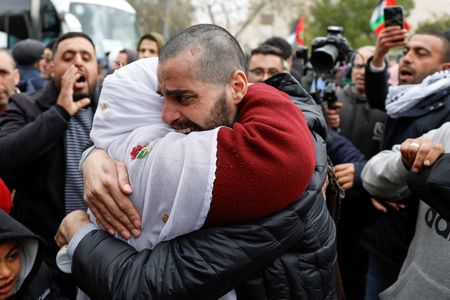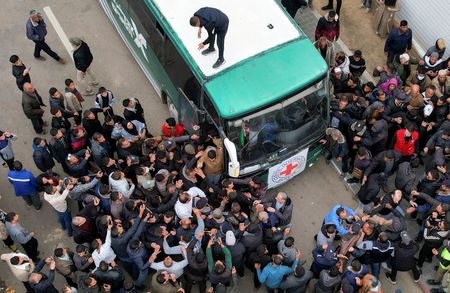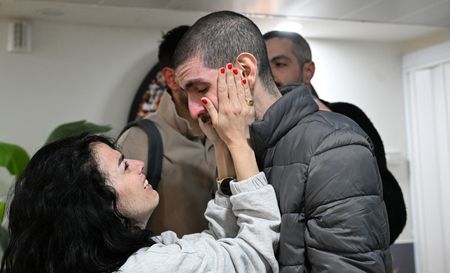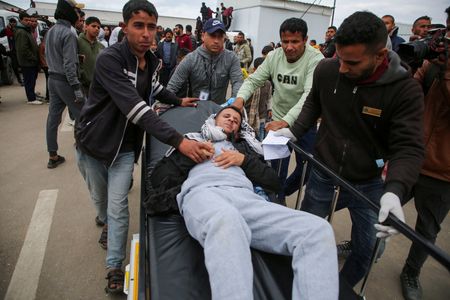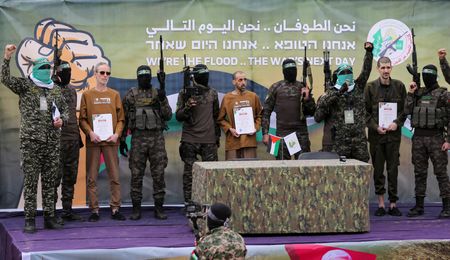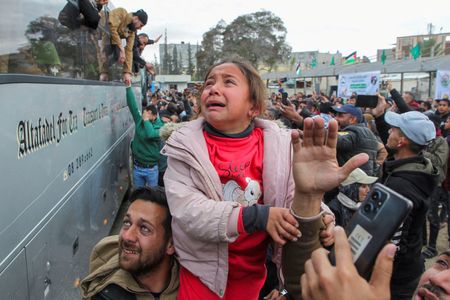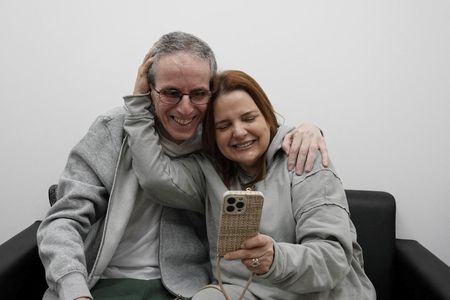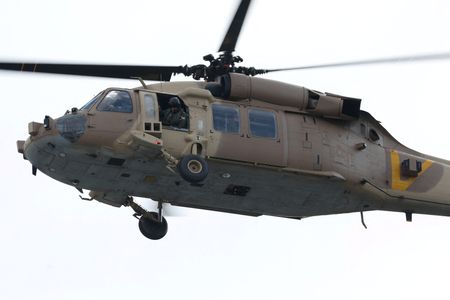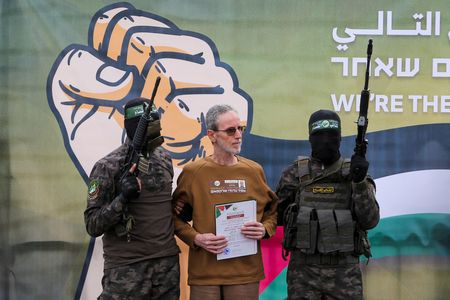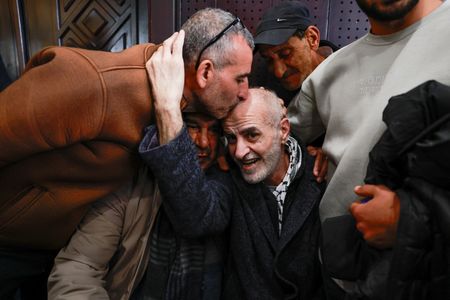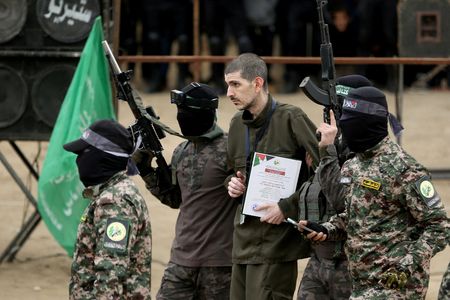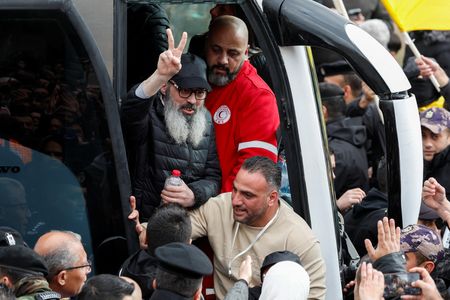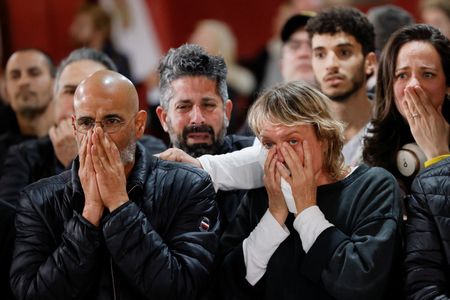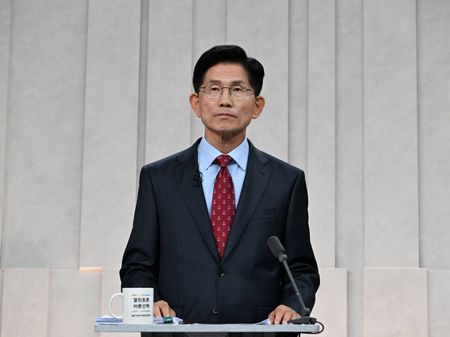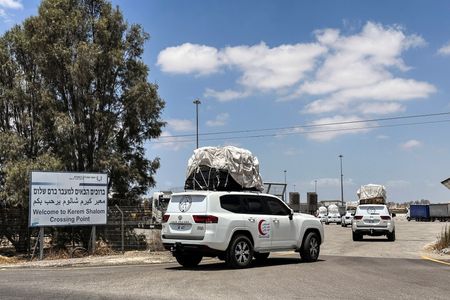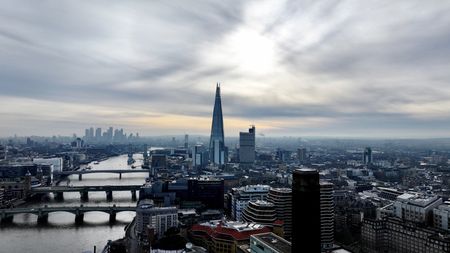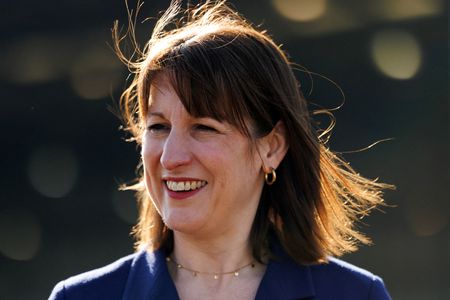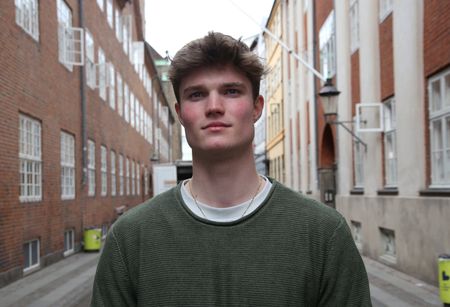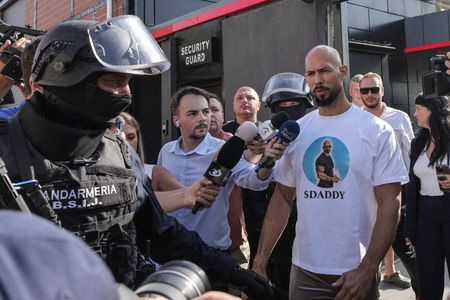By Hussam al-Masri, Nidal al-Mughrabi and Emily Rose
GAZA/JERUSALEM/CAIRO (Reuters) – Palestinian militant group Hamas on Saturday handed over three Israeli hostages whose gaunt appearance shocked Israelis, and Israel began freeing dozens of Palestinians in the latest stage of a ceasefire aimed at ending the war in Gaza.
Ohad Ben Ami and Eli Sharabi, who were taken hostage from Kibbutz Be’eri during the Hamas-led attack on southern Israel on October 7, 2023, and Or Levy, who was abducted that day from the Nova music festival, were led onto a Hamas podium by gunmen.
The three men appeared thin, weak and pale, in worse condition than the 18 other hostages already freed under the truce agreed in January after 15 months of war.
“He looked like a skeleton, it was awful to see,” Ohad Ben Ami’s mother-in-law, Michal Cohen, told Channel 13 News as she watched the Hamas-directed handover ceremony, which included the hostages answering questions posed by a masked man as militants armed with automatic rifles stood on each side.
In another show of force by Hamas, which has paraded fighters during previous releases, dozens of its militants deployed in central Gaza as it handed hostages over to the International Committee of the Red Cross.
The hostages were then driven in ICRC cars to Israeli forces and into Israel, where they had tearful reunions with family members, and flown to hospitals. “We missed you so much,” the mother of Or Levy, Geula, said as she hugged her son.
Israeli Prime Minister Benjamin Netanyahu said the sight of the frail hostages was shocking and would be addressed.
Israel’s President Isaac Herzog described the release ceremony as cynical and vicious. “This is what a crime against humanity looks like,” he said.
The Hostage Families Forum said the images of the hostages evoked images of survivors of Nazi concentration camps during the Holocaust. “We have to get ALL THE HOSTAGES out of hell,” it said.
In exchange for the hostages’ release, Israel was freeing 183 Palestinian prisoners, some convicted of involvement in attacks that killed dozens of people, as well as 111 detained in Gaza during the war.
Cheering crowds greeted the buses as they arrived in Gaza, embracing the freed detainees, some of them weeping with joy and tearing prison-issued bracelets off their wrists.
Among those freed in Ramallah, in the Israeli-occupied West Bank, was Eyad Abu Shkaidem, sentenced to 18 life terms in Israel for masterminding suicide attacks in revenge for Israel’s 2004 assassinations of Hamas leaders.
“Today, I am reborn,” Shkaidem told reporters as the crowd cheered.
The Palestinian Red Crescent medical service said six of the 42 released in the West Bank were in poor health and were taken to hospital. Some prisoners complained of ill-treatment. “The occupation humiliated us for over a year,” said Shkaidem.
PAINFUL RETURN
Some hostages face a painful return. Sharabi’s two teenage daughters and his British-born wife were slain in the Hamas attack on Kibbutz Be’eri, where one in 10 residents was killed.
Israel’s Channel 12 said Sharabi had not been told about their deaths and asked where they were when he arrived.
Levy will be reunited with his three-year-old son. His wife was killed in the attack.
Dr Hagar Mizrachi from Israel’s Ichilov Hospital said the hostages exhibited severe weight loss and malnutrition.
Sixteen Israeli and five Thai hostages have been released so far and 583 Palestinian prisoners and detainees have been freed.
The first 42-day phase of the ceasefire, mediated by Washington, Cairo and Doha, has largely held since it took effect on January 19.
Netanyahu sent a delegation for talks in Doha on Saturday, Israel’s Channel 12 reported, citing a political source.
Concern the deal might collapse before all remaining 76 hostages are free has grown since President Donald Trump’s surprise call for Palestinians to be moved from Gaza and for the enclave to be handed to the United States and developed into the “Riviera of the Middle East”.
Arab states and Palestinian groups have rejected Trump’s proposal, which critics said would amount to ethnic cleansing. Hamas said on Saturday its armed display at the hostage handover showed it could not be excluded from post-war Gaza arrangements.
Netanyahu welcomed Trump’s intervention and his defence minister has ordered the military to make plans to allow Palestinians who wish to leave Gaza to do so.
Under the ceasefire deal, 33 Israeli children, women and sick, wounded and older men are to be released during the first stage in exchange for almost 2,000 Palestinian prisoners and detainees.
Negotiations on a second phase began this week aimed at returning the remaining hostages and agreeing on a full withdrawal of Israeli troops from Gaza in preparation for a final end to the war.
Hamas-led gunmen killed some 1,200 people and seizing more than 250 as hostages in the October 7, 2023 attack, according to Israeli tallies.
The offensive Israel launched in response in Gaza has killed more than 47,000 Palestinians, according to Gaza health authorities, and devastated much of the enclave.
(Additional reporting by Ali Sawafta in Ramallah, Andrew Mills in Doha, Leonardo Benassatt in Ganei Tikva and Yigal Elimelech in Hod Hasharon; Writing by James Mackenzie and Maayan Lubell; Editing by Alistair Bell, David Evans, Alex Richardson and Timothy Heritage)

